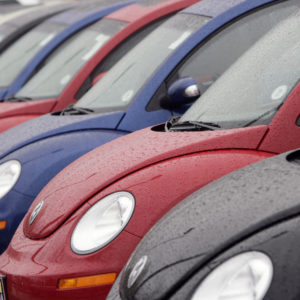Volkswagen would like the world to know it plans to produce a million electric cars by 2022, likely leapfrogging (or maybe eliminating) competition like Tesla. The key to VW’s rapid expansion will be retrofitting two existing plants in China that it claims can be easily adapted to EV production. However, when you take a closer look at the numbers and VW’s conduct, it becomes clear that VW is portraying itself as much more environmentally friendly than its bottom line will allow.
The recent EV announcement followed a number of indictments, lawsuits and even jail terms late last year over VW’s notorious diesel engine emissions cheating scandal. That’s the little software trick that senses when the engine is being emissions-tested and drastically cuts the nitrogen oxide and particulates coming out of the car’s tailpipe in order to pass muster. But when the same car gets back on the road, these emission controls turn themselves off.
Why did VW accept such legal exposure and risk? It correctly sensed that people wouldn’t like the way their diesels ran if the emissions controls were working. Without them, the cars delivered very un-diesel like performance with great gas mileage and a lot of pep. Cynics — including this one — wondered what they had done, as a strictly emissions-controlled diesel engine is not supposed to perform like that.
Well, this turned out to be not just VW’s scam — it was just the leaders in the field. And a closer look at the purported million EVs in 2022 (that’s just 27 months from now) reveals that VW is still selling smoke and mirrors.
The big problem with EVs has always been that they cost too much to appeal to the mass market — but the clever accountants at VW have a plan: cover the cost by nearly doubling the sales of vehicles that people really want and for which they are willing to pay a lot: VW’s high-profit-margin SUVs.
VW produced 10,830,000 vehicles in 2018, edging out Renault-Nissan-Mitsubishi as the world’s largest manufacturer. Very close to 2.5 million, or 23 percent, were SUVs. Given its historical growth, it is a reasonable assumption that the VW group will produce around 12 million vehicles in 2022. VW now says that 40 percent, or 4.8 million of these, will be SUVs, with particular attention to the U.S. and China markets.
A million of the total production, or 8.3 percent, will be EVs. But 19 percent of the company’s output will be additional SUVs, which have higher fuel consumption than the fleet average vehicle they will replace. When you do the math, making conservative assumptions about the real emissions of the fleet, VW’s plan is still slightly positive with regard to carbon-dioxide emissions.
But what about those 600,000 EVs that are to be sold (and powered) in China? According to the U.S. Energy Information Administration around 72 percent of China’s electricity in 2015 came from the combustion of coal, with a few more percent from natural gas. In other words, a lot of the energy powering those 600,000 “zero emission” vehicles will in fact come from the combustion of fossil fuels, with coal producing more carbon dioxide per unit of electricity than any other source.
According to Bloomberg, the Chinese powered EV fired car has only an effective 20 percent reduction in greenhouse-gas emissions. So it’s really not the emissions savings of 600,000 EVs — it’s a lot less.
Of course, these numbers can get better as long as China — by far the world’s largest emitter of carbon dioxide — transitions away toward electricity sources other than coal. Before you start banking on that, however, the Energy Information Administration says that Chinese coal consumption for electricity is going to be pretty constant until at least 2040.
Volkswagen group may generate great publicity for its big EV push — but paying for it by building more SUVs and powering so many EVs with dirty Chinese electricity just seems like more smoke and mirrors.

